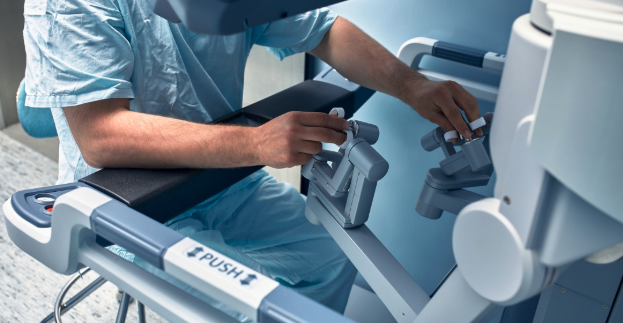
Urology is a surgical specialty that focuses on the health of the urinary tract and the male reproductive system. The urinary tract includes the kidneys, bladder, ureters, and urethra.
While many associate urology with men’s health, it covers a broad spectrum of male and female health concerns.
Examples include kidney stones, urinary tract infections, bladder disorders, prostate conditions, and urologic cancers. Urologists also treat children born with urinary tract abnormalities.
To help you learn more about this medical specialty, we spoke with Dr. Zane Giffen, a urologist at the Western Reserve Hospital.
Based on Dr. Giffen’s insights, this article will guide you through what urology means, who it benefits, and when you need to see a urologist.
What Does Urology Cover in Healthcare?
Urology covers two systems. The first is the urinary tract, which filters waste and controls urination. The second is the male reproductive system, which governs fertility and sexual health.
Despite their distinct functions, these systems are connected. When something goes wrong with either one, a urologist is the doctor who steps in.
“Urology is the part of medicine that covers the urinary tract. That includes the kidneys, the tubes that connect the kidneys to the bladder, called the ureters, the urethra, which excretes urine, and the bladder. It also covers the male sexual organs, including the testicles, the penis, and the prostate,” explains Dr. Giffen.
A urologist is a medical doctor who is an expert in identifying problems within these two systems.
This includes diagnosing and treating structural abnormalities, infections, blockages, and other disorders that impair normal function.
Urologists undergo five or more years of specialist training after graduating from medical school.
They also play an important role in prevention. For example, they:
- Offer guidance on screening for prostate cancer
- Help patients identify and reduce the risk factors for urological disease
- Enable patients to make lifestyle choices that protect their urinary and reproductive health
Common Conditions Treated by Urologists
“The most common diseases and symptoms that we treat in the office are urinary tract symptoms in men, often due to an enlarged prostate, bladder control issues such as overactive bladder or urge urinary leakage, urological cancers like kidney cancer, bladder cancer, testicle cancer, or prostate cancer, blood in the urine, and kidney stones,” Dr. Giffen says.
Many patients see a urologist for urinary issues, such as:
- Enlarged prostate (BPH) – causes slow, weak, or frequent urination
- Overactive bladder (OAB) – leads to sudden urges and leaksUrinary incontinence – loss of bladder control in men and women
- Urinary retention – inability to urinate
- UTIs – cause pain and burning during urination
Urologists also diagnose and treat cancers of the urinary and reproductive systems.Kidney cancer
- Urinary bladder cancer
- Prostate cancer
- Testicular cancer
- Cancer of the adrenal glands
Other major concerns for which you should see a urologist include:
- Kidney stones, which cause severe pain in the sides of the abdomen
- Blood in the urine (hematuria), a warning sign of cancer
- Erectile dysfunction (ED)
- Male infertility, including problems with sperm production and quality
Many of these conditions worsen over time if left untreated. Seeking care under a urologist early prevents complications and, in cases like cancer, saves lives.
Do Urologists Treat Both Men and Women?

Yes, urologists treat both men and women. Many people assume that urologists only treat men, which is far from the truth. Women also experience a variety of urologic conditions that significantly impact their daily lives.
Women see a urologist for female urinary tract conditions like:
- Urinary tract infections
- Overactive bladder
- Urinary incontinence
- Urinary tract stones
- Blood in the urine
“Absolutely. I think one of the common misconceptions about urology is that we only treat men. Many of these issues affect women as well, and it's important that women also have access to quality urologic care,” says Dr. Giffen when asked about whether he treats women.
How Urology Overlaps With Other Medical Specialties
Urology overlaps with nephrology, a field of internal medicine focused on non-surgical kidney diseases.
“Nephrology manages medical kidney issues like chronic disease or renal failure, including dialysis and medications. Urology handles kidney surgery, such as removing stones or masses. It’s like how a cardiologist treats heart disease, but a cardiac surgeon performs bypasses,” explains Dr. Giffen.
Urology also overlaps with gynecology, which focuses on the female reproductive system.
“Some urinary subspecialties, like female urology, are managed by gynecologists or urologists. They treat conditions like pelvic organ prolapse and urinary incontinence,” adds Dr. Giffen.
A patient with severe kidney stone pain may need both a nephrologist and a urologist. Similarly, a woman with bladder leakage after childbirth may see both a gynecologist and a urologist.
Subspecialties in Urology
While most urologists are trained to handle a wide variety of urinary and reproductive health issues, some choose to focus on specific areas after going through a residency program.
Some of these areas include:
- Pediatric urology. It treats urinary and genital issues in children, including birth defects and bladder control problems.
- Reconstructive urology. It focuses on repairing damage from injuries, surgeries, or strictures that block urine flow.
- Urologic oncology. It focuses on cancers of the kidneys, bladder, prostate, and testicles.
- Andrology. These urologists specialize in erectile dysfunction, testosterone imbalance, and male infertility.
- Female urology. Female urologists treat urinary incontinence, pelvic organ prolapse, and other bladder issues affecting women.
Dr. Giffen explains that the majority of urologists in the U.S. — about 60% — are general urologists, including those at Western Reserve.
These specialists handle a wide range of urological conditions and provide comprehensive care for most cases. However, he notes that some complex issues require more specialized treatment, which is typically provided at academic medical centers.
Common Procedures Performed by Urologists
Urologists treat urinary and reproductive conditions using minimally invasive procedures. “The most common treatments,” Dr. Giffen notes, “are for enlarged prostate, bladder leakage, and kidney stones.” They also address sexual health, erectile dysfunction, and cancers of the kidney, bladder, testicle, and prostate at Western Reserve.
Examples of minimally invasive urological procedures include:
- Endoscopic prostate procedures, where surgical tools attached to a tiny camera are used to relieve symptoms of an enlarged prostate
- Laser kidney stone removal
- MRI-guided prostate biopsies, a precise method to detect prostate cancer early
Urologists also perform more invasive surgical procedures, such as:
- Robot-assisted surgeries used for kidney, bladder, and prostate conditions
- Penile implants, a long-term solution for men with severe erectile dysfunction who don’t respond to other treatments
- Percutaneous nephrolithotomy, where a cut is made in the back to access and remove large kidney stones that can't be treated with less invasive methods
- Surgical removal of the entire prostate gland and surrounding tissues to treat prostate cancer
Myths and Misconceptions About Urology
Many people have the wrong idea about what urologists do. Let’s clear up three common myths:
- Myth: Urology is only for men.
Fact: "The biggest misconception is that urologists only treat men. In reality, many urologic issues affect both men and women," says Dr. Giffen. “By age 70, 1 in 16 women will experience kidney stones, and up to 20% may have microscopic blood in their urine, both of which require a urologic evaluation.”
- Myth: Urinary problems are just a normal part of aging.
Fact: While bladder issues become more common with age, you don’t have to live with them. Many symptoms can be successfully treated with medication or minor procedures.
- Myth: Urology is only about kidney stones.
Fact: Urology covers far more than kidney stones. For example, urologists treat cancers of the kidney, bladder, prostate, and testicles. They also treat infections, sexual health issues, and urinary tract problems in both men and women.
When Should You See a Urologist?
Many people brush off urinary or reproductive issues. But some symptoms signal serious underlying conditions and should never be ignored.
According to Dr. Giffen, “Any visible blood in the urine requires a urologic evaluation. Men over 50 should be screened for prostate cancer. Anyone experiencing bothersome urinary symptoms, such as urgency, frequency, or incontinence, should also seek care”.
Here are some signs it’s time to see a urologist:
- Blood in the urine. It could indicate an infection, kidney stones, or cancer.
- Painful urination. Persistent burning or discomfort isn’t normal and needs attention.
- Difficulty starting urination. Struggling to begin urinating could indicate prostate enlargement or other blockages.
- Testicular pain or lumps. Any abnormalities in the testicles should be examined promptly as they could indicate cancer, especially in young males.
- Frequent urinary tract infections. Recurring infections need specialized treatment.
- Difficulty with penile erection. It might be because of a urological issue and should be discussed with a urologist.
Lifestyle Habits for a Healthy Urinary System
Your daily habits significantly impact urinary health.
Hydration is key. “Patients prone to kidney stones should aim for 2.5 to 3 liters of urine output daily, requiring about 80–100 ounces of fluids,” says Dr. Giffen. Water flushes out waste and maintains urine flow.
Excessive animal protein raises the risk of kidney stones, so reduce red meat and processed foods. Caffeine and alcohol irritate the bladder, worsening symptoms—consume them in moderation.
Exercise benefits more than the heart. “A healthy diet and 150 minutes of moderate exercise per week improve both sexual and urologic health,” Dr. Giffen explains.
Underlying conditions also affect urinary function. Sleep apnea, for instance, causes frequent nighttime urination, but treating it improves sleep quality.
Advancements in Urology — The Future of Care

Urology is rapidly advancing, replacing major surgeries with minimally invasive techniques.
“Urology leads in minimally invasive surgery, using robot-assisted procedures for the kidney, bladder, and prostate, along with newer treatments for enlarged prostates,” says Dr. Giffen.
Robot-assisted surgery improves precision, reduces incision size, and speeds recovery.
For prostate cancer, advanced imaging and image-guided biopsies allow earlier, more accurate diagnoses. Genetic testing helps doctors assess risk and customize treatments before cancer develops.
“The field is now more patient-centered,” Dr. Giffen says. “Treatment plans are tailored to individual needs.” With continued innovation, care will become even more personalized and less invasive.
Take Charge of Your Urologic Health With Western Reserve Hospital
Your urinary and reproductive health plays a bigger role in your well-being than you realize. Urology impacts daily life, and ignoring symptoms can lead to bigger problems down the road.
At Western Reserve Hospital’s Department of Urology, Dr. Zane Giffen and his team are committed to patient-centered, expert care for both men and women.
We treat a wide range of urological diseases, including prostatic enlargement, bladder cancer, erectile dysfunction, kidney stones, low testosterone, and urinary tract infections.
If you or a loved one is experiencing urological symptoms, don’t delay seeking care. Reach out to us today.
